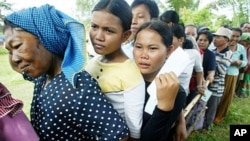A group of Asean lawmakers in Phnom Penh Tuesday passed a resolution to help protect migrant workers, including Cambodians who are increasingly reporting abuse in their jobs abroad.
Cambodian domestic laborers, especially those bound for Malaysia, have reported numerous abuses in recent months, underscoring the dangers in Cambodia’s efforts to ease unemployment through migration.
However, officials of the Asean Inter-Parliamentary Assembly say they will seek to protect the rights of migrant workers across the region, while improving their wages and working conditions.
“AIPA is concerned with the abuse, violence, discrimination as well as violation of human rights of migrant workers,” according to the resolution passed Tuesday, under the 32nd General Assembly of the group.
Ho Naun, head of the labor committee for the National Assembly, told reporters Tuesday that Cambodian workers—legal or not—in Malaysia, South Korea, Thailand and other countries would benefit from the resolution.
“We ask that the receiving countries protect the rights of Cambodians and not punish migrant workers,” she said. “If Cambodian migrant workers are illegal, we ask that country to allow them to meet with Cambodian diplomatic officials there to send them back home, not to imprison them and not to mistreat them.”
Tep Ngorn, vice president of the Senate, said in closing remarks Tuesday the resolution would help countries stop human trafficking and would protect migrant workers.
However, Cambodia is facing a problem of abuse of its workers abroad.
According to the Ministry of Labor, Cambodia sent nearly 5,800 legal workers in Malaysia in 2010, nearly two-thirds of them women.
Workers have reported sexual abuse and other mistreatment, long hours and malnourishment once they get to Malaysia, along with recruiting agencies here that are reluctant to let them go once they have paid for their passports, documents and incentives.
At least two women bound for Malaysia have died at recruiting centers this year.
On Monday, Srey Sophal, the mother of a maid in Malaysia, told reporters her daughter was raped at least twice last month by her Malaysian employer.
“My daughter called me, crying, saying that the house owner beat her and threatened to drop her from the top of the house,” she said Monday. She appealed to the government to help bring her daughter home.
Van Sakrany, general director of the Champa Manpower Group Ltd, which recruited the woman, said he was flying to Malaysia to investigate.




